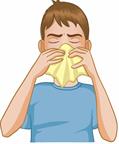Cough, Pediatric
Coughing is a reflex that clears your child's throat and airways (respiratory system). It helps to heal and protect your child's lungs. It is normal for your child to cough from time to time. A cough that happens with other symptoms or lasts a long time may be a sign of a condition that needs treatment. A short-term (acute) cough may only last 2–3 weeks. A long-term (chronic) cough may last 8 or more weeks.
Coughing is often caused by:
An infection of the respiratory system.
Breathing in things that irritate the lungs.
Allergies.
Asthma.
Postnasal drip. This is when mucus runs down the back of the throat.
Gastroesophageal reflux. This is when acid comes back up from the stomach.
Some medicines.
Follow these instructions at home:
Medicines
-
Give over-the-counter and prescription medicines only as told by your child's health care provider.
-
Do not give your child cough medicines (cough suppressants) unless the provider says that it is okay. In most cases, these medicines should not be given to children who are younger than 6 years of age.
-
Do not give honey or honey-based cough products to children who are younger than 1 year of age. For children who are older than 1 year of age, honey can help to lessen coughing.
-
Do not give your child aspirin because of the link to Reye's syndrome.
Eating and drinking
Lifestyle
General instructions

- If coughing is worse at night, older children can try sleeping in a semi-upright position. For babies who are younger than 1 year old:
Do not put pillows, wedges, bumpers, or other loose items in their crib.
Follow instructions from the provider about safe sleeping guidelines for babies and children.
-
Watch for any changes in your child's cough. Tell the provider about them.
-
Have your child always cover their mouth when they cough.
-
If the air is dry in your child's bedroom or in your home, use a cool mist vaporizer or humidifier. Giving your child a warm bath before bedtime may also help.
-
Have your child rest as needed.
Contact a health care provider if:
-
Your child develops a barking cough.
-
Your child makes high-pitched whistling sounds when they breathe out (wheezes) or loud, high-pitched sounds when they breathe in or out (stridor).
-
Your child has new symptoms, or their symptoms get worse.
-
Your child coughs up pus.
-
Your child wakes up at night because of their cough or vomits from the cough.
-
Your child has a fever that does not go away or a cough that does not get better after 2–3 weeks.
-
Your child loses weight for no clear reason.
-
Your child is short of breath.
-
Your child's lips turn blue.
-
Your child coughs up blood.
-
Your child may have choked on an object.
-
Your child has pain in their chest or abdomen when they breathe or cough.
-
Your child seems confused or very tired (lethargic).
-
Your child who is younger than 3 months has a temperature of 100.4°F (38°C) or higher.
-
Your child who is 3 months to 3 years old has a temperature of 102.2°F (39°C) or higher.
These symptoms may be an emergency. Do not wait to see if the symptoms will go away. Get help right away. Call 911.
This information is not intended to replace advice given to you by your health care provider. Make sure you discuss any questions you have with your health care provider.
